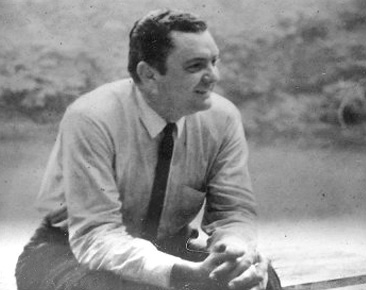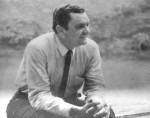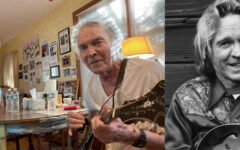
 December 1, 2016, marks the 50th anniversary of the passing of Carter Stanley, described as an Appalachian mountain musical legend.
December 1, 2016, marks the 50th anniversary of the passing of Carter Stanley, described as an Appalachian mountain musical legend.
With the passage of five decades, fewer of us have been alive long enough to have seen Carter Stanley onstage, some may have done so, but can’t remember. So, the sentiments in Miss Dixie Hall’s I Wish I Could Have Met Carter are shared by so many of us and young Colonel Isaac Moore speaks so well on our behalf.
Bob Cantwell, in his book Bluegrass Breakdown: The Making of the Old Southern Sound, described Carter Stanley’s singing thus, “The vocal tone, which has something of a sob in it, is very characteristic of the old Regular Baptist testimony or salvation story. It wavers between song and speech, and it’s an extremely intimate way of talking, where you hear the most candid and ingenuous expressions of feeling, and Carter certainly had that in his voice.”
No better judge than Bill Monroe rated Carter Stanley as “the finest natural lead singer there ever was”.
Larry Ehrlich, who recorded the Stanley Brothers one night in 1956 for the album An Evening Long Ago says, “Carter sang with the greatest ease of any singer I have ever watched … His unique, impeccable phrasing and timing were the result. He had the most tender voice I have ever heard.”
 Of his exceptional song-writing George Shuffler, often noted as the third Stanley Brother, says Carter’s song-writing themes stemmed from his homesickness. He would often write while the brothers were en-route to a show, composing songs as he surveyed the scenes visible from his car window. “If we weren’t home, we were trying to get home”, says Shuffler, metaphorically. Songs like I Long to See the Old Folks, Memories of Mother, The Fields Have Turned Brown and Rank Strangers are typical of how his imagination worked.
Of his exceptional song-writing George Shuffler, often noted as the third Stanley Brother, says Carter’s song-writing themes stemmed from his homesickness. He would often write while the brothers were en-route to a show, composing songs as he surveyed the scenes visible from his car window. “If we weren’t home, we were trying to get home”, says Shuffler, metaphorically. Songs like I Long to See the Old Folks, Memories of Mother, The Fields Have Turned Brown and Rank Strangers are typical of how his imagination worked.
As we can ascertain from recordings of ‘live’ performances Carter Stanley was an affable MC who kept the show going by cracking jokes and generally engaging with the audience. Off stage he was gregarious and good natured.
We have asked a number of people, “50 years after his premature passing, how do you like to remember Carter Stanley?”
The author of Curly Seckler’s life story, Foggy Mountain Troubadour, Penny Parsons is a very avid fan of the Stanley Brothers …
“Carter Stanley was one of the great singers and songwriters of bluegrass music who left us much too early. Sadly, he was plagued by personal demons and was not fortunate enough to see the kind of fame and success that eventually was enjoyed by his younger brother Ralph. Carter’s legacy lives on in the music of the Stanley Brothers and in the vast catalog of songs he wrote that have been and continue to be performed by generations of bluegrass musicians.”
Chris Henry has had a varied musical career, beginning as a four-year-old, playing mandolin and earning praise from Bill Monroe himself. As a teenager he turned to rock music, heavy metal and then punk rock. Now he fronts his own band, Hardcore Grass, so termed because of the intensity with which they perform his music.
“Carter Stanley is still the gold standard, no one has consistently deliver as much mountain soul and feeling in such a natural, endearing, and powerful way. His songs and legacy are as rich, and in some ways richer, than ever before in the modern world.
He was an ultimate teacher about the good and bad in bluegrass.
The taste in which he embellished melodies always matched the musical weather of the song. In the modern day of over-doing it, Carter shows us divine balance there.”
As is his wont, British acoustic music promoter and journalist, now retired, John Atkins, has an original perspective …
“Carter Stanley. What can I say. The most emotive voice in bluegrass. A wonderful song writer, and with Ralph made some of the music that will stand as the best of all time. The Mercury years were their best, I thought, but the early Columbias and most of their King Recordings also stood up as classics. I never tire of playing those wonderful, usually, badly pressed, heavyweight King albums.
When I was preparing for a feature on Ralph for CMP, I was quite surprised to find that the Stanley Brothers were in the same studio on the same day as Hank Williams. A reminder that at the time, they and their record company, thought they were making music that may be commercially successful. That it was not has nothing to do with the quality of the music and it will probably last, and certainly be revered, for longer than most of the stuff that did make commercial gold dust.”
After a 15 year break from bluegrass music, Mark Kuykendall recently formed a partnership with ace fiddler Bobby Hicks. Their second CD is expected early next year ….
“I always loved Carter’s singing and he was one of my heroes and when I was with Monroe I would ask him about different band members and he would talk about how much he liked Carter’s singing!!!”
Chris Stuart is an award-winning songwriter who once played guitar and banjo, but now is hooked on the Anglo concertina and Irish music ….
“I’ve sometimes thought about what if Carter Stanley had lived. Although we have a substantial catalog of Carter on record, what would he have done through the 1970s, 1980s, 1990s, and beyond? Perhaps Ralph might not have had the career he had, but we’re the poorer for not having Carter’s voice for all those years. To me, Carter, more than any other singer in bluegrass, sang pure soul music. His tone and control are what I go back to when I want to remind myself of the essence of country music.
The first bluegrass song I ever learned was the Stanley Brothers’ version of Lonesome River and it’s still the most achingly beautiful duet I’ve ever heard. I know how important the Monroe Brothers were to them, but it’s like the Stanley’s perfected that sound.”
Another award-winning songwriter, Jon Weisberger, is an award-winning journalist also. He plays bass with Chris Jones & The Night Drivers and produces a radio program (hosted by Del McCoury) for the Sirius/XM Satellite Radio Network Bluegrass channel.
“I guess I tend to think of Carter Stanley first and foremost as a singer – one with a distinctive sound that brought a unique dimension to bluegrass singing. Carter’s voice tended to the mournful – weary and resigned, almost stoic – yet he could also convey a wry, and sometimes even broad sense of humor. Though a few have come close, no one has succeeded in sounding like him. As a songwriter, he had a rare ability to use imagery and turns of phrase that conveyed not only the aura of mountain life and culture, but also their deep connections to the past, which lent the songs a powerfully simultaneous feeling of emotional directness and formal distance – traits which have been stamped on the repertoire ever since. He was truly one of the giants of what was called, in his day, hillbilly music.”







